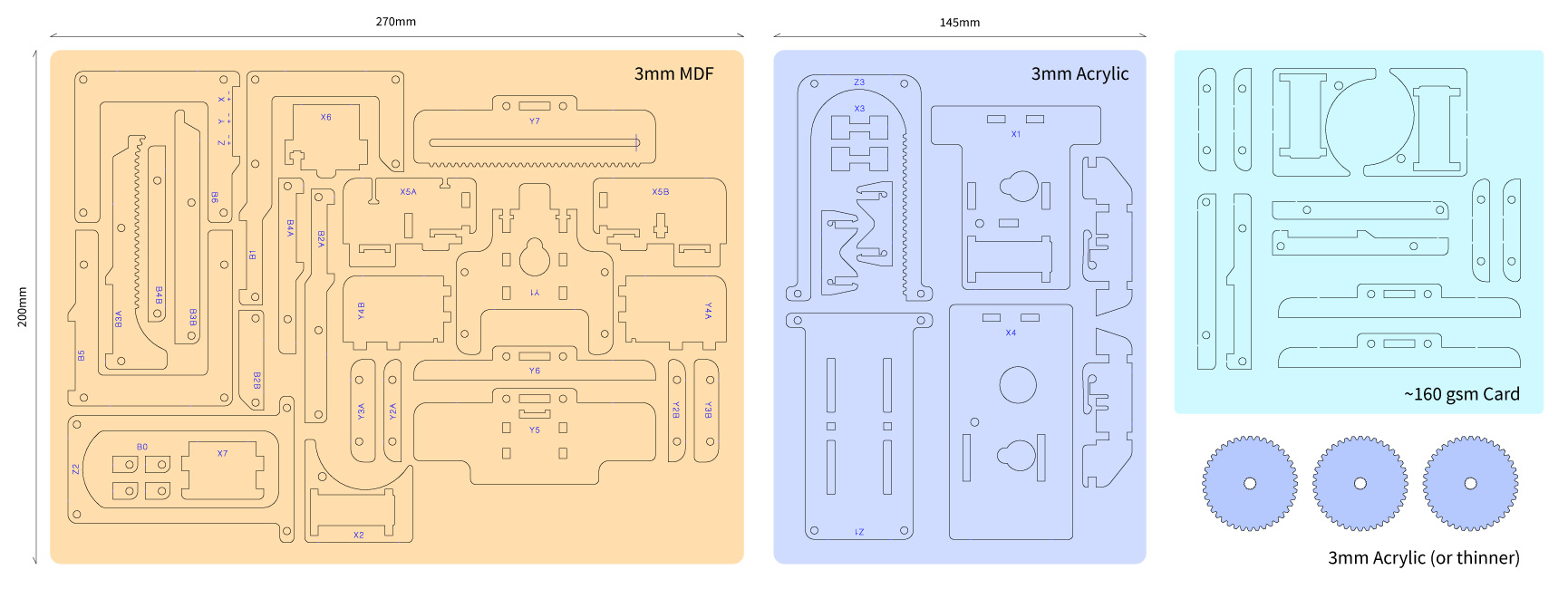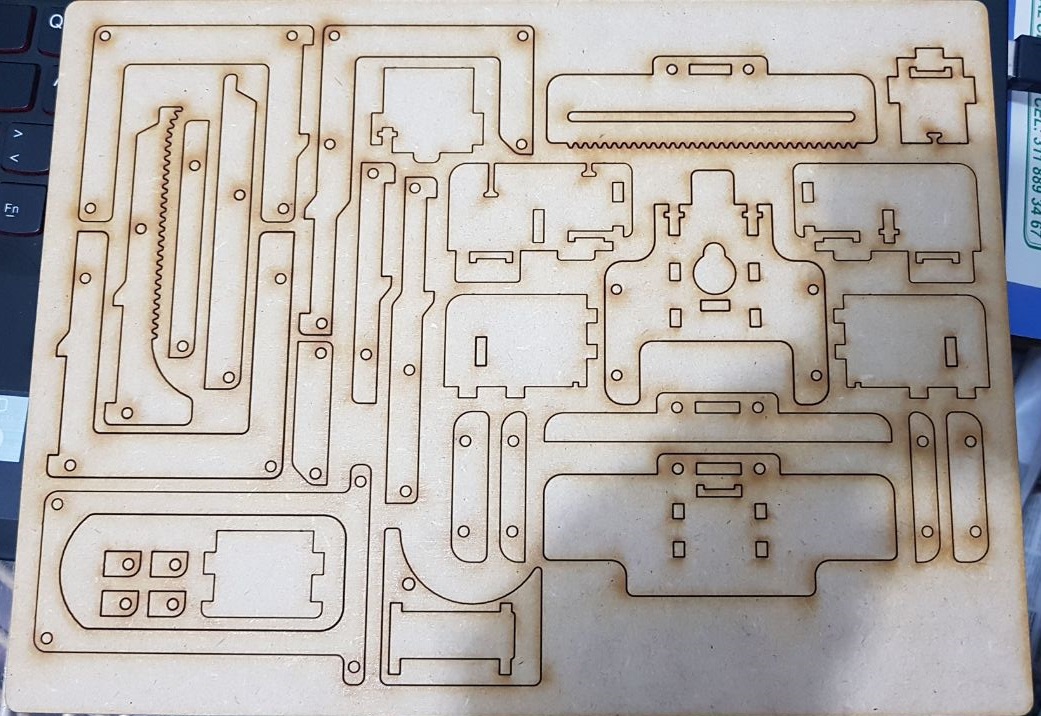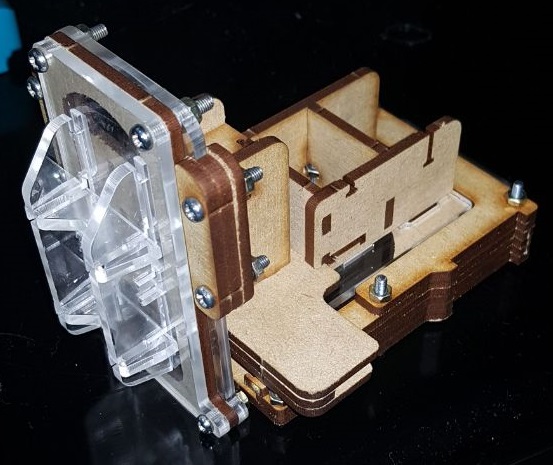You are viewing an older revision! See the latest version
Como hacer un Piccolo
En la siguiente documentación plantearemos como hacer un Piccolo, para ello empezaremos con lo básico
¿Qué es un Piccolo?
Piccolo es un CNC de bolsillo que nos sirve para dibujar en 2D, formas o figuras que le pidamos, trabaja en base a movimientos de 3 servo motores que nos permiten realizar el dibujo y un engranaje sencillo de piñones para dar dirección a nuestra herramienta de dibujo, esta puede ser un lápiz, marcador, bolígrafo, etc.
Materiales para elaborar un Piccolo
- 3 Micro Servo SG90
- 8 Tornillos de cabeza plana M3 de 10 mm
- 3 Tornillos de cabeza plana M3 de 16 mm
- 2 Tornillos M3 de 10 mm
- 4 Tornillos M3 de 22 mm
- 17 Tuercas de bajo perfil M3
- 1 Llave hexagonal de 2.5 mm
- 1 Llave hexagonal de 2 mm
- 1 Cable USB microB
- 1 Banda elástica
- 2 Ataduras de cables (opcional)
- 4 Pies de goma adhesiva de 6.4 mm (opcional)
- 1 Tarjeta Nucleo STM32F411
- Piezas de MDF: entre 2,75 y 3,10 mm
- Partes acrílicas: entre 2,90 y 3,20 mm
Para elaborar las piezas de corte de MDF y las partes acrílicas se necesita realizar un corte láser, a continuación el esquema de corte

A tener en cuenta: Los engranajes: iguales o más delgados que las otras partes acrílicas, pero mayores de 2 mm.
Para realizar la de forma correcta la fabricación del Piccolo, por favor visitar la guía oficial de fabricación
https://github.com/DiatomStudio/Piccolo/wiki/Piccolo-Fabrication-Guide

¿ Comó ensamblar el Piccolo?
Para el montaje del Piccolo dirigirse a:
https://github.com/DiatomStudio/Piccolo/wiki/Piccolo-Assembly-Instructions
Y Seguir el paso a paso, debería quedar así:

Ahora programaremos nuestra Tarjeta NucleoSTM32F411
Para la compilación de la misma usaremos el compilador de Mbed y ahí crearemos nuestro código
Crearemos un nuevo archivo y empezaremos a programar
Primero importaremos las librerías que vamos a usar y habilitaremos los puertos que usaremos para conectar nuestros Servos
/***** Librerías *****/ #include "mbed.h" /**************PUERTOS I/O DE SISTEMA EMBEBIDO NUCLEO-F411RE*******************/ #define DEBUG 1 Serial command(USBTX, USBRX); DigitalOut led(LED1); PwmOut myServoX(PB_3); //Servo X PwmOut myServoY(PB_4); //Servo Y PwmOut myServoZ(PC_7); //Servo Z InterruptIn button(USER_BUTTON); // interrupcion boton stop volatile bool button1_pressed = false; volatile bool button1_enabled = true;
*************** COMANDO MOVER MOTOR |POS 1|POS 2|POS 3|POS 4| POS 5| | < | #C | a | b | > | | 3C |0 al A| D1 | D2 | D3 | D4 | 3E | #C -> indica el comando. En este caso es de 0 a 10 (en hexadesimal) a,b,c,d parametros del comando <,> -> inicio, y fin de comando el inicio de comando no se almacena en el buffer *****************
*****VARIABLES DEFINIDAS*****/
- define BUFF_SIZE 6 tamaño del comando enviado desde CoolTerm
- define COMM_N 0
- define INITPARAMETER 1
- define MAXPOS 50 Posicion maxima de la matriz de dibujo x,y en mm
- define POSDRAW 30 Posicion del servomotor Z para dibujar #define SS_TIME 100 no puedo degarla declarada cte. pues se debe mod por teclado
- define PI 3.1415926 uint8_t RSTEP = 5; Ini. variable de Resolucion para el dibujo uint8_t DET=1; uint8_t posx_old=0; posición anterior del eje X uint8_t posy_old=0; posición anterior del eje Y uint8_t SSTIME = 100;
/******COMANDOS DE TECLADO*****/
- define LED_NC 0 ok
- define DOT_NC 1 ok
- define LINE_NC 2 ok
- define RECTANGULO_NC 3 ok
- define CIRCLE_NC 4 ok
- define HOME_NC 5 ok
- define RESOLUCION_NC 6 ok
- define TIEMPOPASOS_NC 7 No se a que se refiere.
- define STOP_NC 8 Pendiente
- define PAUSA_NC 9 Pendiente
- define REANUDAR_NC 10 Pendiente #define MOVER_NC 11 Se refiere a el movimiento del motor paso a paso
/**FUNCIONES PARA MOVER LOS SERVOS X, Y, Z*****/
int coord2pulse(float coord) { if(0 <= coord <= MAXPOS) return int(750+coord*1900/50); u6 return 750; }
void vertex2d(float x, float y) Funcion para enviarle la posicion a (x,y) { wait_ms(SSTIME); int pulseY = coord2pulse(y); int pulseX = coord2pulse(x);
myServoY.pulsewidth_us(pulseY); myServoX.pulsewidth_us(pulseX);
}
void draw() Funcion para enviarle la posicion de dibujo a z. { wait_ms(SSTIME*10); int pulseZ=coord2pulse(POSDRAW); myServoZ.pulsewidth_us(pulseZ); wait_ms(SSTIME); } void nodraw() Funcion para enviarle la posicion de no dibujar a z. { wait_ms(SSTIME*10); int pulseZ=coord2pulse(0); myServoZ.pulsewidth_us(pulseZ);
}
void initdraw(float x, float y)ok { vertex2d(x,y); wait_ms(SSTIME); draw(); }
/***FUNCIONES PARA OBTENER E IMPRIMIR EL COMANDO***/
uint8_t buffer_command[BUFF_SIZE]={0,0,0,0,0}; Matriz del Comando enviado
void print_num(uint8_t val) { if (val <10) command.putc(val+0x30); else command.putc(val-9+0x40); }
void print_bin2hex (uint8_t val) Imprimir el comando enviado en Hexadecimal { command.printf(" 0x"); print_num(val>>4); print_num(val&0x0f); }
void Read_command() Leer el comando que se digito en CoolTerm { for (uint8_t i=0; i<BUFF_SIZE;i++) buffer_command[i]=command.getc(); }
void echo_command() { for (uint8_t i=0; i<BUFF_SIZE;i++) print_bin2hex(buffer_command[i]); }
uint8_t check_command() Verifica el ultimo valor del comando enviado '>' { if (buffer_command[BUFF_SIZE-1]== '>'){
- if DEBUG command.printf("\nComando: "); print_bin2hex(buffer_command[COMM_N]); command.printf(" -> ");
- endif return 1; }
- if DEBUG command.printf("\n !!!!!!!!ERROR EN EL COMANDO!!!!!!!!!!!!!! -> "); echo_command();
- endif return 0; }
/****FUNCIONES PARA DIBUJAR EN EL PICOLO****/
void Led(int tm) Funcion para definir el tiempo de led en milisegundos {
- if DEBUG command.printf("\nTiempo led: %i seg\n", tm);
- endif led=1; wait(tm); led=0; }
void punto(uint8_t x, uint8_t y) Funcion para dibujar un punto {
- if DEBUG command.printf("\nCoordenadas x=%i, y=%i\n",x,y);
- endif initdraw(x,y); nodraw(); }
void linea(float xi, float yi, float xf, float yf) {
- if DEBUG command.printf("\nCoordenadas xi=%f, yi=%f, xf=%f, yf=%f, resolucion: %i \n", xi,yi,xf,yf,RSTEP);
- endif float xp,yp; float m=(yf-yi)/(xf-xi); float b=yf-(m*xf);
- if DEBUG command.printf("\n b =%f, m=%f \n", b,m);
- endif float nstep =(m/RSTEP); nstep=RSTEP;
- if DEBUG command.printf("\nstep = %f \n", nstep);
- endif if ((abs(xf-xi))>abs(yf-yi)){ if (xf>xi){ initdraw(xp,yp); for (xp=xi; xp<=xf; xp+=RSTEP){ yp =m*xp+b; vertex2d(xp,yp);
- if DEBUG command.printf(" CASO 1: ( dx>dy & xf>xi ) Coordenadas x=%f,y=%f \n", xp,yp);
- endif } } else{ float temp = xi; xi = xf; xf = temp; initdraw(xp,yp); for (xp=xi; xp<=xf; xp+=RSTEP){ yp =m*xp+b; vertex2d(xp,yp);
- if DEBUG command.printf(" CASO 2: ( dx>dy & xf<xi ) Coordenadas x=%f,y=%f \n", xp,yp);
- endif }}} else { if (yf>yi){ initdraw(xp,yp); for (yp=yi; yp<=yf; yp+=RSTEP){ xp=(yp-b)/m; vertex2d(xp,yp);
- if DEBUG command.printf(" CASO 3: ( dy>dx & xf>xi ) Coordenadas x=%f,y=%f \n", xp,yp);
- endif }} else{ float tempo = yi; yi = yf; yf = tempo; initdraw(xp,yp); for (yp=yi; yp<=yf; yp+=RSTEP){ xp=(yp-b)/m; vertex2d(xp,yp);
- if DEBUG command.printf(" CASO 4: ( dy>dx & xf<xi ) Coordenadas x=%f,y=%f \n", xp,yp);
- endif } } } nodraw(); }
void Rectangulo(uint8_t x, uint8_t y, uint8_t a, uint8_t h) {
- if DEBUG command.printf("\nCoordenadas x=%i, y=%i, ancho=%i, alto=%i, resolucion=%i\n", x,y,a,h,RSTEP);
- endif uint8_t A=x+a; uint8_t B=y+h; initdraw(x,y);
for(uint8_t xi=x; xi<=(x+a); xi+=RSTEP){ vertex2d(xi,y);
- if DEBUG command.printf("Coordenadas x=%i,y=%i for 1\n", xi,y);
- endif } for (uint8_t yi=y; yi<=(y+h); yi+=RSTEP){ vertex2d(x+a,yi);
- if DEBUG command.printf("Coordenadas x=%i,y=%i for 2\n", x+a,yi);
- endif } for(uint8_t xf=A; xf>x; xf= xf - RSTEP){ vertex2d(xf,B);
- if DEBUG command.printf("Coordenadas x=%i,y=%i for 3\n", xf,B);
- endif } for (uint8_t yf=(y+h); yf>y; yf-=RSTEP){ vertex2d(x,yf);
- if DEBUG command.printf("Coordenadas x=%i,y=%i for 4\n", x,yf);
- endif } vertex2d(x,y);
- if DEBUG command.printf("Coordenadas x=%i,y=%i for 4\n", x,y);
- endif nodraw(); }
void circle(uint8_t cx, uint8_t cy, uint8_t radio) { int y; int x; vertex2d(cx,cy);
- if DEBUG command.printf("\nCoordenadas xc =%i, yc =%i, Radio=%i \n",cx,cy,radio);
- endif
for(double i=0; i<=PI/2 ;i+=((PI/2)/RSTEP)) { x=radio*cos(i); y=radio*sin(i); initdraw(x+cx,y+cy);
- if DEBUG command.printf("Coordenadas x =%li, y =%li, R=%i, Resolcion:%i \n",x+cx,y+cy,radio,((PI/2)/RSTEP));
- endif }
- if DEBUG command.printf("\n");
- endif for(double i=PI/2; i<=PI ;i+=((PI/2)/RSTEP)) { x=radio*cos(i); y=radio*sin(i); vertex2d(x+cx,y+cy);
- if DEBUG command.printf("Coordenadas x =%li, y =%li, R=%i, Resolcion:%i \n",x+cx,y+cy,radio, ((PI/2)/RSTEP));
- endif }
- if DEBUG command.printf("\n");
- endif for(double i=PI; i<=((3*PI)/2) ;i+=((PI/2)/RSTEP)) { x=radio*cos(i); y=radio*sin(i); initdraw(x+cx,y+cy);
- if DEBUG command.printf("Coordenadas x =%li, y =%li, R=%i, Resolcion:%i \n",x+cx,y+cy,radio,((PI/2)/RSTEP));
- endif }
- if DEBUG command.printf("\n");
- endif for(double i=((3*PI)/2); i<=(2*PI) ;i+=((PI/2)/RSTEP)) { x=radio*cos(i); y=radio*sin(i); initdraw(x+cx,y+cy);
- if DEBUG command.printf("Coordenadas x =%li, y =%li, R=%i, Resolcion:%i \n",x+cx,y+cy,radio,((PI/2)/RSTEP));
- endif } nodraw(); }
void home() { nodraw(); vertex2d(0,0);
- if DEBUG command.printf("\nCoordenada HOME x=0, y =0");
- endif }
void resolucion(int res) Funcion para definir la resolucion del dibujo { RSTEP = res;
- if DEBUG command.printf("\nResolucion definida en=%i \n", RSTEP);
- endif }
void TiempoPasos(int SST) Funcion para definir el tiempo de led { SSTIME=SST;
- if DEBUG command.printf("\nTiempo en pasos definida en:%i\n",SSTIME);
- endif } void sstime(uint8_t x, uint8_t y) { double dx=abs(x-posx_old); double dy=abs(y-posy_old); double dist= sqrt(dx*dx+dy*dy); wait_ms((int)(SSTIME*dist)); posx_old =x; posy_old=y;
}
void Stop() Funcion para detener el programa { exit(0);
/* if(ST == 0){ home();
- if DEBUG command.printf("\n...Parada total...\n", ST);
- endif exit(ST); } */ }
void Pausa(int p) Funcion para definir el tiempo de led {
- if DEBUG command.printf("\n...Pausado...\n");
- endif }
void Reanudar(int det) Funcion para definir el tiempo de led {
- if DEBUG command.printf("\nReanudando imagen...%i/n", DET);
- endif
}
/*void Mover(int tm) Funcion para definir el tiempo de led {
- if DEBUG command.printf("\nMover a: %i/n", tm);
- endif }
- /
/***** CASOS DE USO PARA SELECCION DE COMANDOS***/
void command_exe() { switch (buffer_command[COMM_N]){
case (LED_NC):
- if DEBUG command.printf(" LED ON/OFF\n");
- endif Led(buffer_command[INITPARAMETER]); break;
case (DOT_NC):
- if DEBUG command.printf(" PUNTO\n");
- endif punto(buffer_command[INITPARAMETER], buffer_command[INITPARAMETER+1]); break;
case (LINE_NC):
- if DEBUG command.printf(" LINEA\n");
- endif linea(buffer_command[INITPARAMETER],buffer_command[INITPARAMETER+1],buffer_command[INITPARAMETER+2],buffer_command[INITPARAMETER+3]); break;
case (RECTANGULO_NC):
- if DEBUG command.printf(" RECTANGULO\n");
- endif Rectangulo(buffer_command[INITPARAMETER],buffer_command[INITPARAMETER+1],buffer_command[INITPARAMETER+2],buffer_command[INITPARAMETER+3]); break;
case (CIRCLE_NC):
- if DEBUG command.printf(" CIRCULO\n");
- endif circle(buffer_command[INITPARAMETER],buffer_command[INITPARAMETER+1],buffer_command[INITPARAMETER+2]); break;
case (HOME_NC):
- if DEBUG command.printf(" HOME\n");
- endif home(); break;
case (RESOLUCION_NC):
- if DEBUG command.printf(" RESOLUCION\n");
- endif resolucion(buffer_command[INITPARAMETER]); break;
case (TIEMPOPASOS_NC):
- if DEBUG command.printf(" TIEMPO EN PASOS\n");
- endif TiempoPasos(buffer_command[INITPARAMETER]); break;
case (STOP_NC):
- if DEBUG command.printf(" STOP\n");
- endif Stop(buffer_command[INITPARAMETER]);
break;
case (PAUSA_NC):
- if DEBUG command.printf(" PAUSA\n");
- endif Pausa(buffer_command[INITPARAMETER]); break;
case (REANUDAR_NC):
- if DEBUG command.printf(" REANUDAR\n");
- endif Reanudar(buffer_command[INITPARAMETER]); break;
/* case (MOVER_NC):
- if DEBUG command.printf(" MOVER\n");
- endif Mover(buffer_command[INITPARAMETER]); break;
- / default:
- if DEBUG command.printf("Comando no encontrado\n");
- endif } }
int main() { myServoX.period_ms(20); myServoY.period_ms(20); myServoZ.period_ms(20);
- if DEBUG command.printf("inicio con debug\n");
- else command.printf("inicio sin debug\n");
- endif uint8_t val; button.fall(&Stop); while(1){ val=command.getc();
if (val== '<'){ Read_command(); if (check_command()){ command_exe();
- if DEBUG echo_command();
- endif if(button1_pressed ==false){ } } } } }
<</code>>